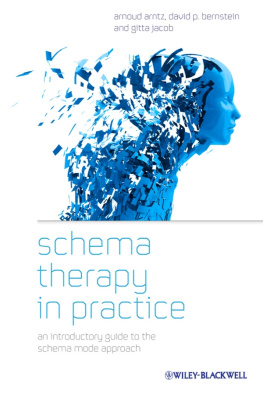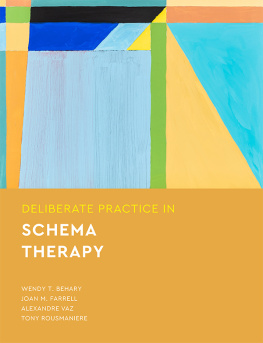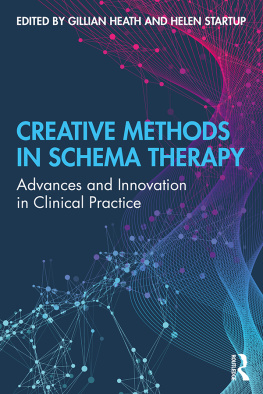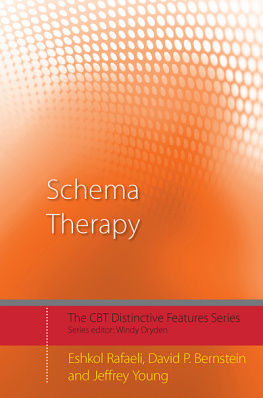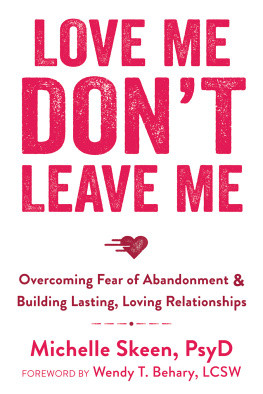
Schema Therapy in Practice
An Introductory Guide to the Schema Mode Approach
ARNOUD ARNTZ, PHD
Department of Clinical Psychological Science, Maastricht University, The Netherlands & Netherlands Institute for Advanced Study in the Humanities and Social Sciences, Wassenaar, The Netherlands
GITTA JACOB, PHD
Department of Clinical Psychology and Psychotherapy, Freiburg University, Germany
The order of authors is based on alphabetical order
This edition first published in English in 2013
2013
This book is a translated version of: Gitta Jacob and Arnoud Arntz, Schematherapie in der Praxis 2011 BELTZ Psychologie in der Verlagsgruppe Beltz Weinheim, Basel
Wiley-Blackwell is an imprint of John Wiley & Sons, formed by the merger of Wileys global Scientific, Technical and Medical business with Blackwell Publishing.
Registered Office
John Wiley & Sons Ltd, The Atrium, Southern Gate, Chichester, West Sussex, PO19 8SQ, UK
Editorial Offices
350 Main Street, Malden, MA 02148-5020, USA
9600 Garsington Road, Oxford, OX4 2DQ, UK
The Atrium, Southern Gate, Chichester, West Sussex, PO19 8SQ, UK
For details of our global editorial offices, for customer services, and for information about how to apply for permission to reuse the copyright material in this book please see our website at www.wiley.com/wiley-blackwell.
The right of Arnoud Arntz and Gitta Jacob to be identified as the authors of this work has been asserted in accordance with the UK Copyright, Designs and Patents Act 1988.
All rights reserved. No part of this publication may be reproduced, stored in a retrieval system, or transmitted, in any form or by any means, electronic, mechanical, photocopying, recording or otherwise, except as permitted by the UK Copyright, Designs and Patents Act 1988, without the prior permission of the publisher.
Wiley also publishes its books in a variety of electronic formats. Some content that appears in print may not be available in electronic books.
Designations used by companies to distinguish their products are often claimed as trademarks. All brand names and product names used in this book are trade names, service marks, trademarks or registered trademarks of their respective owners. The publisher is not associated with any product or vendor mentioned in this book. This publication is designed to provide accurate and authoritative information in regard to the subject matter covered. It is sold on the understanding that the publisher is not engaged in rendering professional services. If professional advice or other expert assistance is required, the services of a competent professional should be sought.
Library of Congress Cataloging-in-Publication Data
Arntz, Arnoud.
Schema therapy in practice : an introductory guide to the schema mode approach / Arnoud Arntz, Gitta Jacob.
p. cm.
Includes bibliographical references and index.
ISBN 978-1-119-96285-4 (cloth) ISBN 978-1-119-96286-1 (pbk.) 1. Schema-focused cognitive therapy. 2. Personality disordersTreatment. I. Jacob, Gitta. II. Title.
RC489.S34A76 2013
616.891425dc23
2012017512
A catalogue record for this book is available from the British Library.
Cover image cosmin4000/iStockphoto
Cover design by www.cyandesign.co.uk
About the Authors
Arnoud Arntz is Professor of Clinical Psychology and Experimental Psychopathology at Maastricht University, the Netherlands. He is Scientific Director of the Universitys Research Center of Experimental Psycho-pathology. He studies psychological theories and therapies for anxiety and personality disorders, and is the principal investigator for a series of multicenter trials investigating the effectiveness of schema therapy for various personality disorders. He also practices CBT and schema therapy.
Gitta Jacob is a Clinical Psychologist, Cognitive and Schema Therapist in the Department of Clinical Psychology and Psychotherapy, University of Freiburg, Germany. She is a founding board member of the International Society for Schema Therapy, and a past Chair of the Working Group on Borderline Personality Disorders at the Department of Psychiatry and Psychotherapy, University Hospital Freiburg.
Acknowledgments
The authors want to express their thanks to Jeffrey Young, the developer of Schema Therapy, for his teaching and deep insights; as well as to other prominent Schema Therapists who influenced their thinking, including Joan Farrell, Ida Shaw, Hannie van Genderen, and David Bernstein; to their collegues with whom they collaborated in applying and further developing Schema Therapy; and last but not least to their patients who helped them to develop the methods and techniques described in this book. This work was supported by a grant from the Netherlands Institute for Advanced Study in the Humanities and Social Sciences (NIAS) (A.A.) and by the European Social Fund and the Ministry of Science, Research and the Arts Baden-Wrttemberg (G.A.).
Introduction
Schema therapy is increasingly attracting the attention of therapists and consumers. This is partly based on the good effects reported by various studies, and partly on its appealing basis in the idea that children require fundamental needs to be met in order to develop in a psychologically healthy way. The integration of insights, methods, and techniques derived from a range of schools, including attachment theory, cognitive behavior therapy, and experiential therapies into a comprehensive model formulated in terms of the most prominent current psychological paradigm, the cognitive model, also plays a role. The promise of schema therapy that it can deal with psychological problems largely ignored by mainstream cognitive behavior therapy, such as recurrent problems in intimate relationships and the processing of troublesome memories and patterns from childhood, is attractive. Finally, the finding that schema therapy contributes to real recovery, defined not only by a reduction of symptoms, but by the creation of a life that is satisfying and of high quality, is undoubtedly appealing.
In teaching the model, methods, and techniques, we felt that a book presenting the practical basics of schema therapy for those that want to learn it as a generic method, and not in a specialized form for one disorder, was missing. We therefore decided to write such a book. This book does not compete with other publications on schema therapy, as it doesnt focus on theory or on a specific disorder. It aims to present the basics of the schema-therapy model based on the relatively new schema mode concept. It is basically an extension of our work with schema modes in almost all personality disorders. As we felt that the mode approach could also have application in some axis-I problems, and in milder personality issues, we decided to present the model, methods, and techniques in a generic way, and to use case examples of various disorders and problems.
The book is divided into two parts. The first deals with case conceptualization and consists of three chapters: , Communicating the Mode Concept to the Patient, explains how an individual mode model can be introduced in therapy.
The second part deals with treatment, in six chapters. Each chapter is devoted to one group of modes and is subdivided into sections on cognitive, emotional, and behavioral interventions and the therapeutic relationship. , Strengthening the Healthy-adult Mode, summarizes how the healthy adult mode is explicitly and implicitly developed in schema therapy. It also addresses how the treatment should develop when completion is near, and how to relate with the patient after formal completion of treatment.
Next page
